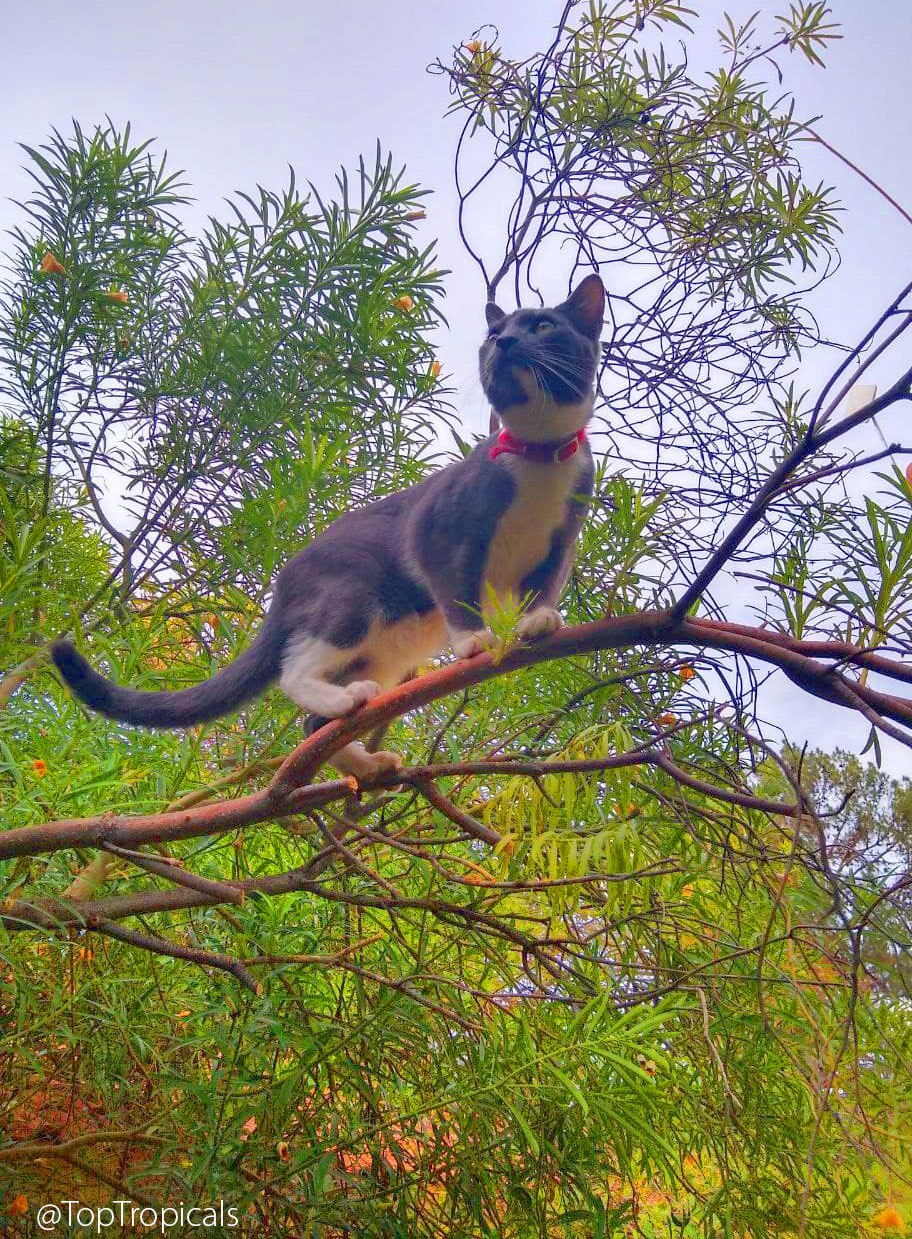
Makaron the Cat
"Yesterday is not ours to recover, but tomorrow is ours to win or lose." - Lyndon B. Johnson.
🐈 PeopleCats.Garden
#PeopleCats #Quotes
🟢 Join 👉 TopTropicals

Makaron the Cat
Tabebuia impetiginosa - Dwarf Pink Tabebuia, Pau DArco, Taheebo
Date:
Winter tips and podcast
Photo above: wrapping plants with frost cloth
Winter can be tough on plants, especially on tropical varieties. But with a little preparation, you can protect your garden and keep your plants safe from the cold. Here's how:
Cut watering: Reduce watering to prevent root rot. Cold + wet = dead roots.
Water before frost: Thirsty plants are more vulnerable. Water them before a cold night to prevent damage.
Wind protection: Wind is more harmful than temperature drops. Plant near structures like houses or trees for shelter.
Prepare for long cold periods: If cold weather lasts for hours, use all available protection, including Christmas lights and propane heaters.
Don't use dry fertilizer in winter: Heavy fertilizing encourages tender growth, which is more susceptible to cold damage. Sunshine Boosters liquid fertilizers are safe to use year around as their intake is controlled by reduced watering.
Use fabric covers, not plastic: Plastic can cook plants in the sun, while fabric allows better ventilation.
Photo above: we cover our plants in the nursery with a thin synthetic fabric (sintepon) called "frost cloth" or "strawberry cloth". It is light, breathable and allows light and water to go through unlike plastic that creates heavy water pockets.
Wrap plants: On cold nights, cover individual plants or trees with sheets or blankets to shield them from wind chill.
Use Christmas lights: A simple string of lights can add extra warmth, protecting your plants during frosty nights.
Use propane heaters: For added warmth in a larger area, place a propane heater near your plants. Make sure to follow safety guidelines and keep the heater at a safe distance from flammable materials. This can help maintain a few extra degrees of warmth, especially in more open garden spaces or temporary greenhouses. Always ensure proper ventilation to avoid harmful gas buildup.
Photo above: we use both propane and kerosene heaters at the nursery
Affordable winter greenhouse: For large plant collections, you don't need an expensive greenhouse. A mobile carport with plastic or fabric covering, costing around $200, can house up to 100 plants!
Photo above: Temporary wrapping around plant collection with a plastic or frost cloth protects from a windchill. It may also win you a few degrees even without a heater. In this particular case, according to our temp sensors, with 30F outside, it was 41F inside this "dome", no heaters used.
Southern windowsills: Compact tropicals can thrive on southern-facing windowsills, getting plenty of sunlight during the day.
Move plants inside: If you have larger collections, move them into a well-lit garage for the colder nights or longer periods.
Photo above: using Christmas lights around plants while wrapping with frost cloth.
Cold duration: Tropical plants can survive brief cold spells but long durations, even above freezing, can be deadly.
Wind-chill: Wind chill can be harsher than the temperature itself.
Exposure: Southern-facing slopes hold heat longer, making them ideal for your plants.
Humidity: Proximity to lakes or oceans can create a milder micro-climate.
Gradual temperature Drops are safer. Plants adjust better to slow temperature changes than sudden cold blasts. Gradual cooling allows plants to prepare, reducing the risk of damage.
Health and maturity: Well-established, healthy plants are more cold-hardy.
Boost plant immunity: Use products like SUNSHINE-Epi to improve cold resistance. Apply it before and during cold snaps to protect your plants.
Healthy plant is hardy. Make sure to fertilize your plants on regular basis - healthier and stronger plants are more cold hardy.
With these steps, you can protect your plants and help them survive the winter months. Stay warm and keep your garden thriving!
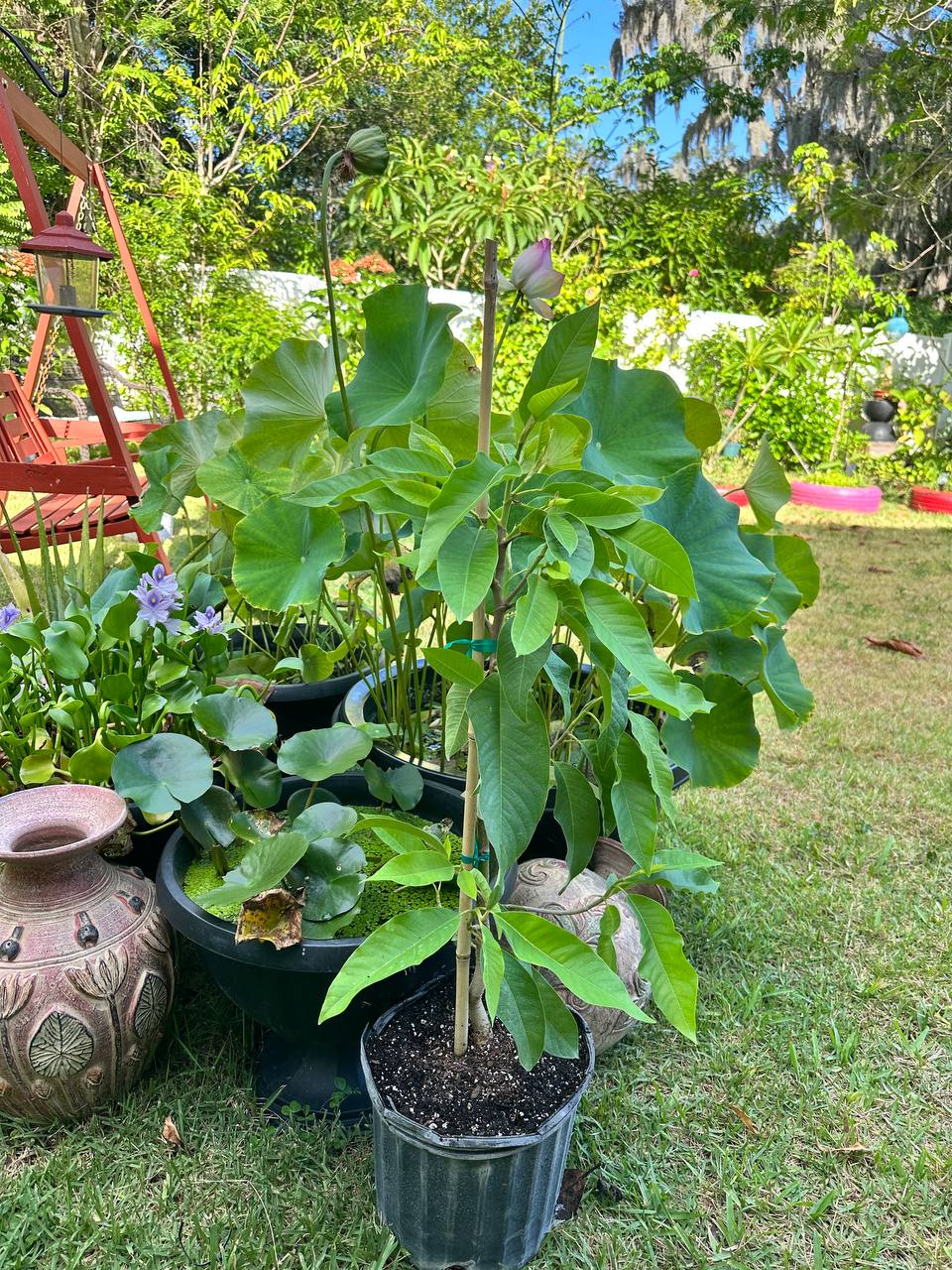
Champaka Tree
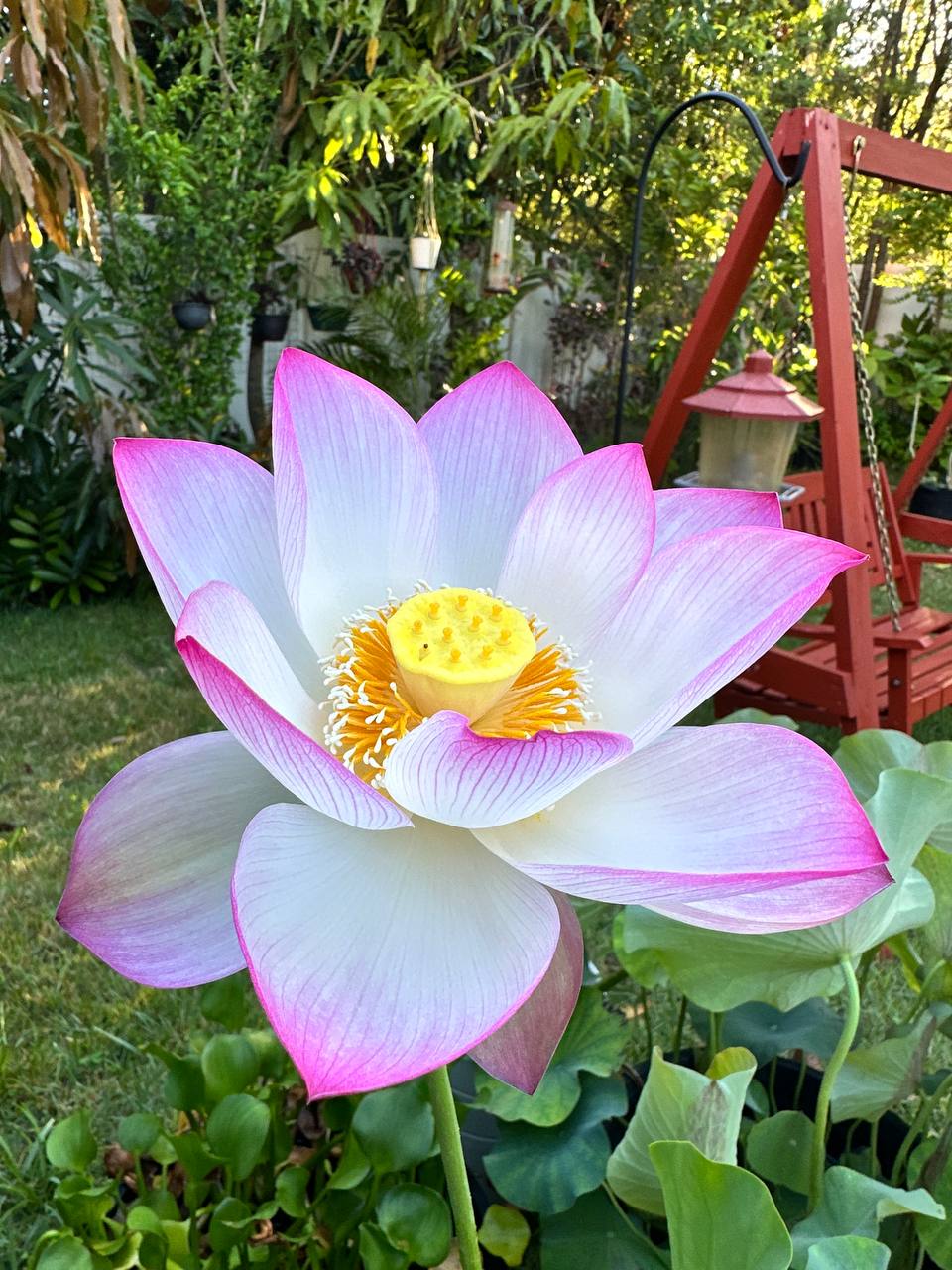
Lotus flower
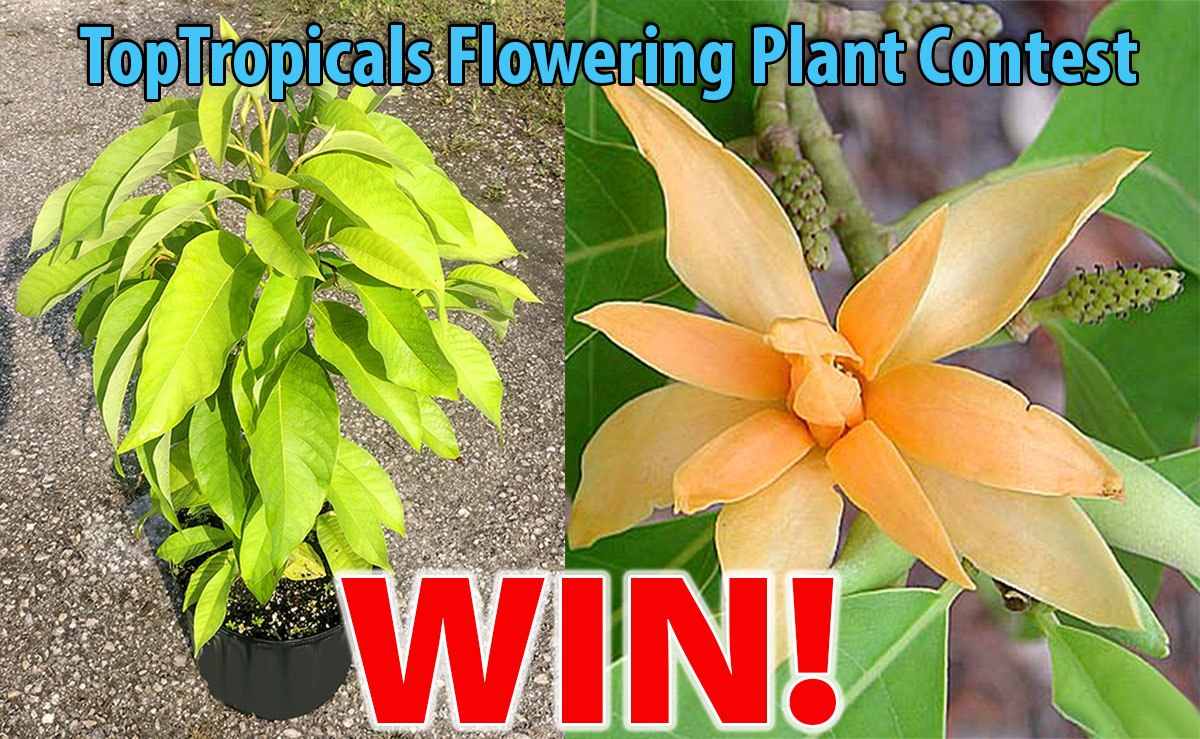
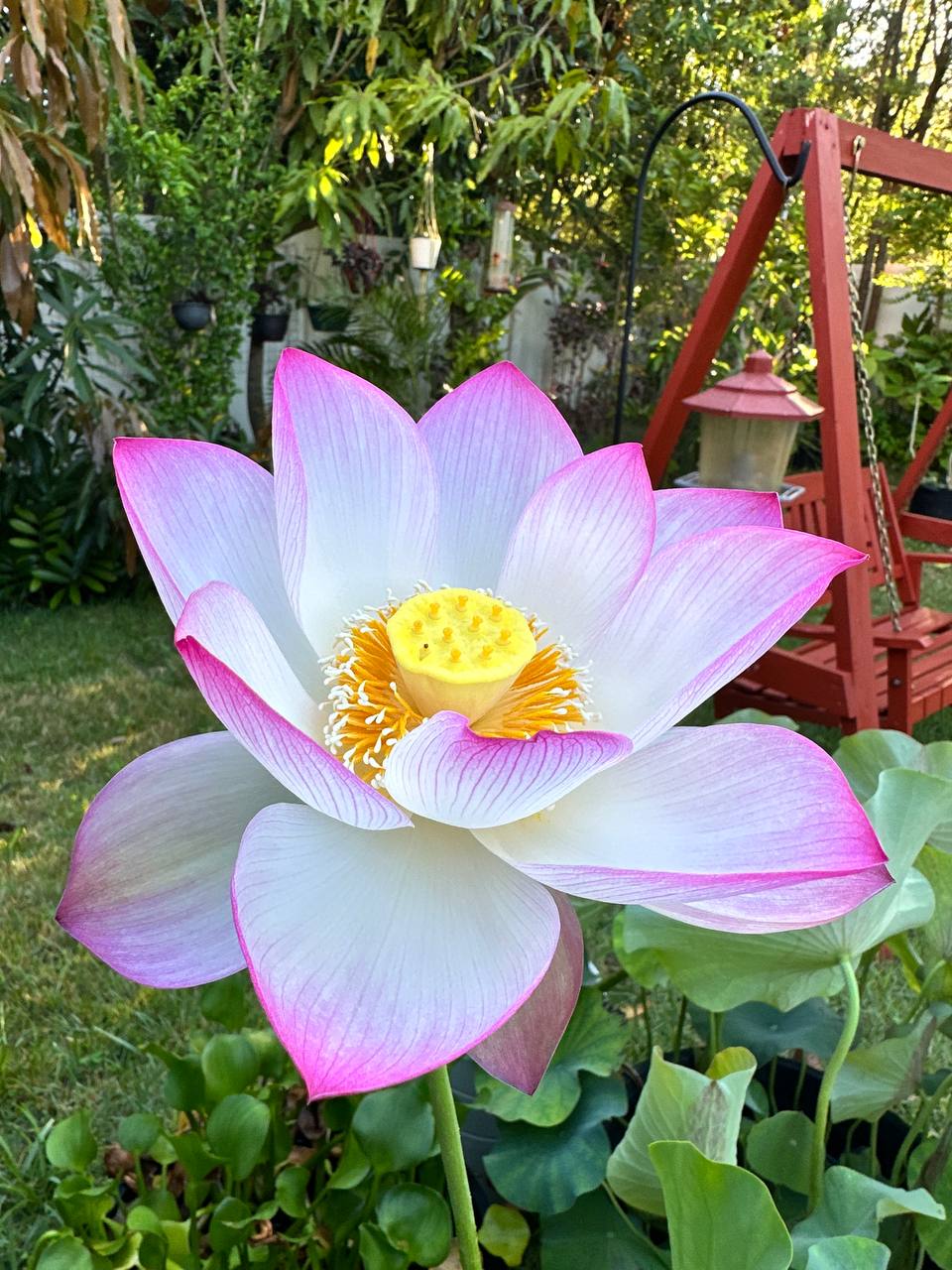
Date:
Pushing the limits of tropical gardening
The year is almost over but the winter is not. This Christmas weekend at our Sebring B-farm we had it down to 30F. As a tropical gardener, winter can be challenging, especially if you grow plants outside of tropical zones.
To protect your garden from the cold, consider the following:
1. Monitor freeze watches and be prepared to take action if
necessary.
2. Create temporary structures like mini-greenhouses using PVC pipes,
carport frames, or bamboo sticks to support covers.
3. Use covers such as frost cloth, cardboard boxes, blankets, and bed
sheets.
4. Use Christmas lights and other heating elements, including propane
heaters, to keep plants warm.
5. Add a layer of heavy mulch around plant trunks to protect them from the
cold.
6. Apply plant boosters that improve cold hardiness, such as Sunshine Epi,
Sunshine-Si, and Sunshine Superfood.
At TopTropicals B-Farm, we sprayed our plants with a special cold hardiness treatment Sunshine-Si and covered and wrapped everything we could. We also moved cold sensitive species inside greenhouses. All of our plants are looking great and happy!
Photo above: Mulching mango trunks and using Christmas lights for cold protection
Read more about this special treatment plan: Cold Hardiness Improvement Kit.
Photo above: Temporary wrapping of a section of a greenhouse with a plastic or frost cloth protects from a windchill. It may also win you a few degrees even without a heater. In this particular case, according to our temp sensors, it was 30F outside, and 41F inside this "dome", no heaters used.
Sunshine Boosters are natural, amino acid-based liquid fertilizers made with only the highest quality ingredients. Starting in 2023, the pricing for Sunshine Boosters will be adjusting to reflect the increasing cost of supplies. This is your last chance to stock up on Sunshine Boosters before the end of the year! Sunshine Boosters are safe to use year around, with every watering.
Don't miss out on this opportunity to get the best value for your money!
Use discount for even better deal:
22FOR22
for 22% off orders $220+
Min order $220. Offer expires 12-31-22
Date:
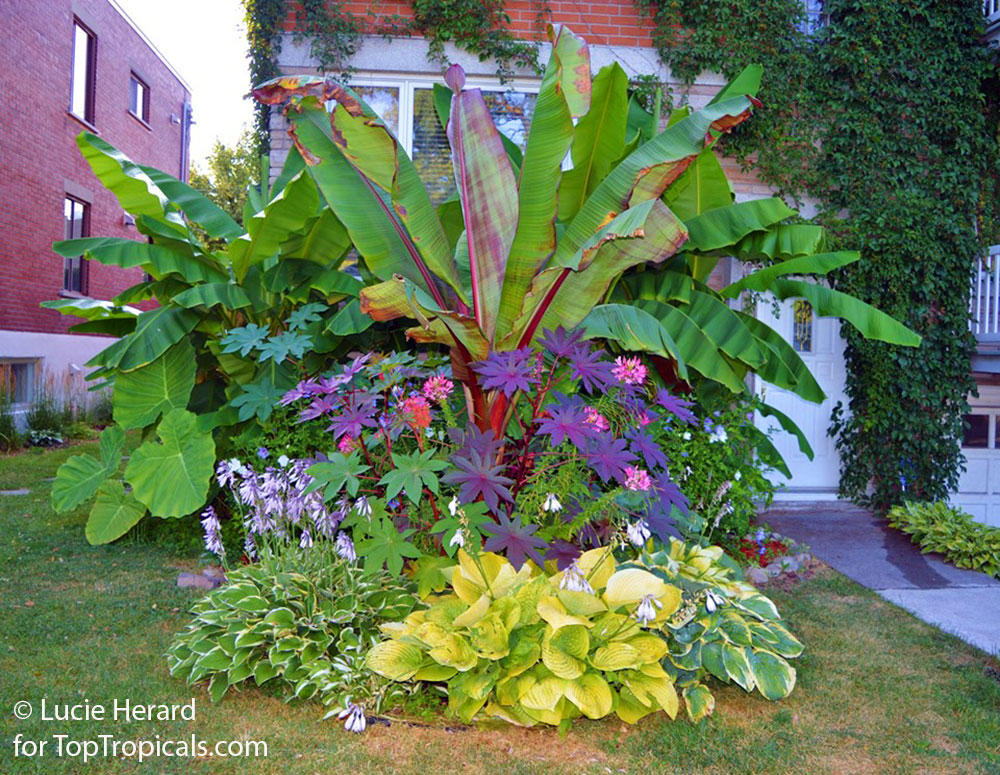
Our customer Lucie
Herard shared pictures of her tropical garden with us... Many of you have
beautiful gardens that you are proud of... but this one is... in Canada! Believe it
or not, before winter she digs everything up and brings it inside! Then in
Spring, she starts again every year. Dedication? Determination? Heroism! Lucie
won the Planet Bananiers photo contest for the third time.
Look at these pictures and visit Lucie's Facebook page for more photos and videos of her amazing garden.
Ask yourself: and what can I do? Is my life really that hard with mowing a
lawn once a week and blowing the leaves? You don't have to be a hero to make
something worthwhile in your life. Just take a shovel and start... one plant a
day. And you will end up living in Paradise.
Lucie reminds you: "Ornamental horticulture production activities are
now considered an essential service! Add soil in a pot, water very slightly for
the first two weeks and put closer to the window. That's all, the leaves
will start growing again!"
Share with us photos of your garden. The winner of this contest will get plants $200 worth, with FREE shipping!

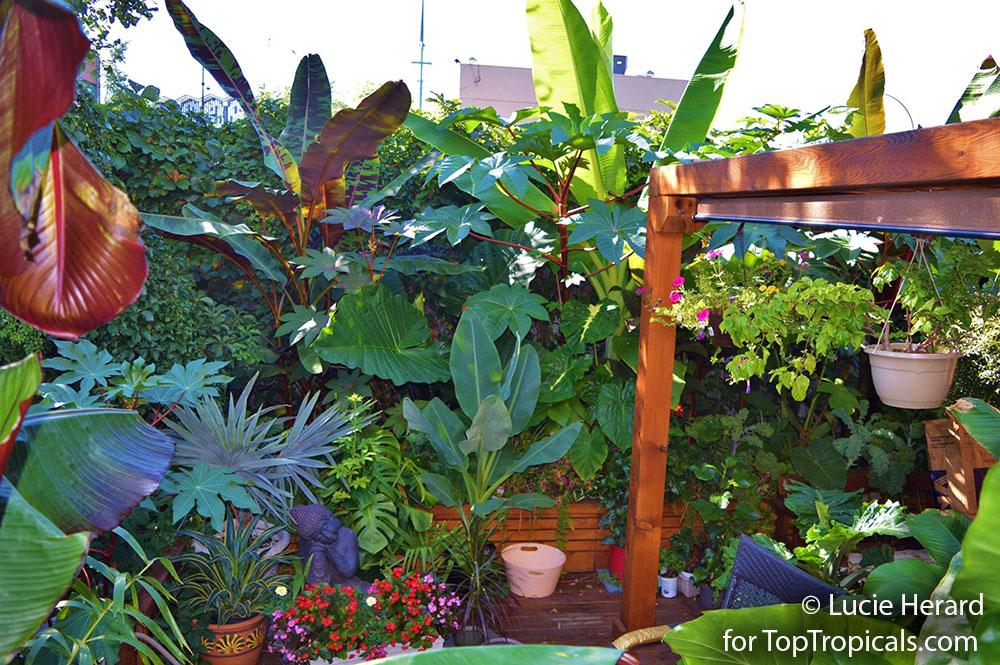
Date:
Q: My tropical plant collection goes indoors for winter. I have over 100 plants now and all windowsill space is taken. I am planning to build some shelves so I can also start some rare seeds indoors. Can you advise me on the choice of the grow lights so I can do it right?
A: Indoor plants are very unlucky: they have to grow in "caves," and everybody knows that plants don't grow in the caves. The luckiest plants win sunny windowsills, but even there they dwell rather like in underbrush under tall trees, where the sun illuminate them only early in the morning or in the evening, and its light is diffused by foliage. Usually, domestic plants are in desperate lack of illumination not only in winter but also in summer. No light - no growth, no flowering. So, plants need extra light to compensate for the lack of illumination in the "room-cave" conditions. And here is some science behind it...
Check out our selection of tropical plants tolerant to low light conditions.